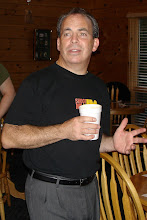Some people preferred the morning edition and some liked the afternoon paper. It was the same with TV news. You either watched the 6:00 early evening news or the 11:00 nightly news before going to bed. And pretty much that was it.
The newspaper and the TV were destinations for the first and/or final word on what was going on in your world. Not anymore.
News is now constant and fluid. There is no longer a beginning or an end. It just exists.
Newspapers, quite frankly, now serve little purpose other than to document (in ink) something that is already history. It is also a fine place to find ads. And TV news; what's that? Blather and hype and conjecture and updates and so on [Editorial note: I do not include Charlie Rose in this category; he is the best].
If I want the news I review my RSS feed or check my Google news alerts. From here I go to virtually any source in the world for breaking real-time news or updates on scores and stories in progress. What was it the Wicked Witch of the West said before melting and shrinking? "What a world, what a world."
And I love it. And so does everyone else. News (a.k.a. information) is constantly available and constantly updated. And when it stops being interesting it is simply archived. What a world indeed. Okay, so the quality of reporting is not what it once was (there are no more Walter Cronkites) and integrity is less apparent (no more Edward R. Murrows)... still, there is a lot of good stuff out there. And sure, you can't be certain what you should believe, but hell, half the world still believes John Kennedy was killed by the government and that our American astronauts never landed on the moon. So really, what's the difference anyway?
I just feel sorry for those sad few (or maybe it's tens of millions) who don't have routine access to the Internet. They have no idea what they are missing, plus there's all that black ink on their fingers from reading their newspapers. In the words of Jerry Seinfeld, "that's a shame."
Back in the day, some powerful community leader or representative of the downtrodden (a guy like Ralph Nader, maybe) might have appealed to the masses by way of a strong speech or tightly written editorial. Not anymore. We now have blogs for that... millions and millions of blogs (like this one) and YouTube. So many places for so many people to say so many things.
Once upon a time words had unbelievable power - whether spoken or written - if they were sincere and delivered by the right person. And you would read them in your morning or afternoon paper or watch them on the TV news. And sometimes these words even changed the world. But not anymore.

No comments:
Post a Comment